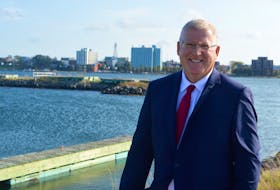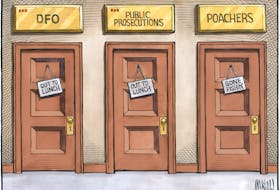He had already hit the gym. By 8:30 Friday morning, the coffee — in a family-sized mug, for some reason emblazoned with the letter H — would have already been starting to kick in as Iain Rankin sat in a love seat in his corner office at One Government Place in downtown Halifax.
A month after he took over as the premier of Nova Scotia, the office still has a just-moved-in feel.
On one wall, some children’s drawings; on another, a picture of Rankin photo-bombing his old boss Stephen McNeil and yet-to-become PM Justin Trudeau, not far away from a Barack Obama campaign poster, the famous photographed silhouettes of Jack and Robert Kennedy during the Bay of Pigs Crisis, as well as the equally iconic shot of Joe Carter rounding the bases after his 1993 World Series home run. (Rankin, who still plays pick-up basketball, has lots more sports memorabilia at home, but admitted that he is reluctant to bring it in for fear of making his office too “bro-ish.")
It has been, he conceded, quite a first month, not just getting a reconfigured government up and running, but quickly tabling legislation, some of which has been well received, other parts roundly criticized, and a budget, all in the middle of a global pandemic.

The 37-year-old had a full day ahead of him Friday: a slate of virtual meetings with politicians, heads of organizations and others looking for some of the new premier’s time, and another live COVID-19 briefing with Dr. Robert Strang, Nova Scotia's chief medical officer of health.
In an hour, Rankin would be in the legislature defending his just-tabled budget — projected to run a $585-million deficit due to COVID costs and increased health-care investments — against the Progressive Conservatives and New Democrats, a prospect that left him unfazed.
“I do very much think that we hit the areas that people need to see some increased focus and investment (in), especially because of the pandemic,” Rankin told me.
He said the province needs a biodiversity act because biodiversity loss is connected to climate change. The trouble was that there was “discomfort from people” who feared that the original act would enable the government “to use a heavy hand with enforcement,” which “was never the intention.”
At the top of that list, Rankin said, would be mental health, which is budgeted for $336.5 million in spending, the largest in the province’s history, including a $12.3-million increase for new programming.
But the biggest immediate impact, he thought, would come from a $100-per-month increase for every individual receiving income assistance, while long-term care and home care, for which the province has earmarked another $100 million, “will continuously be a pressure, but one which we should continue to be focused on.”
Rankin would have liked to have done more in the budget. “We need to continue to support those core services around health care, education and community services,” he said, “but inheriting a half-a-billion-dollar deficit limits your scope of how far you can go.”
Wanting to “develop a path back to a balanced budget,” the new premier had to pick and choose, supporting the green and digital economies, along with other “areas that we found to be strategic, and that really builds on momentum of younger people wanted to stay and raise their families here,” while doing what had to be done to mitigate the damage from COVID-19.
Oh yeah, the pandemic. When I asked if he acted hastily in opening up the border with New Brunswick, while our neighbours held back, Rankin said no.
The epidemiological evidence was that it was safe to allow New Brunswickers to visit Nova Scotia again, without quarantining, even if New Brunswick Premier Blaine Higgs decided to wait until the Atlantic bubble resumes on April 19 to reciprocate. “Once I have evidence to back up a decision, I take it,” said Rankin.
He said, as well, that he is “very comfortable” with Nova Scotia’s vaccine rollout, which some have criticized as laggardly.
“I think we have the benefit of really focusing on what Dr. Strang wants to do,” he said, “which is population immunity and working backwards from those (who) are most aged, and … looking at the long game so that we're ready for a robust supply which is imminent.”
There were other things on Rankin's mind Friday, too. After the pandemic, the most pressing issues for Nova Scotia in his view are inequality and climate change, which, the way he sees it, are connected.
“We have history that's not comfortable to talk about for many of us that have colonial heritage,” he said. “But I think that because of that, we're able to lead.”
After the pandemic, the most pressing issues for Nova Scotia in his view are inequality and climate change, which, the way he sees it, are connected.
What Rankin means is that by reconciling the government's relationship with the Mi’kmaq, which has begun, and forging a new relationship with historic Black communities by, for example, ensuring they have legal title to their land and are not left behind economically, all Nova Scotians will benefit.
It’s the same with climate change, a central emphasis of Rankin’s campaign for the Liberal leadership. When the government this week unexpectedly proposed reducing the powers in the recently tabled Biodiversity Act, critics said it caved to pressure from the forestry lobby. Rankin saw it differently.
He said the province needs a biodiversity act because biodiversity loss is connected to climate change. The trouble was that there was “discomfort from people” who feared that the original act would enable the government “to use a heavy hand with enforcement,” which “was never the intention.”
Good leaders “are ones that listen to people and find compromise”, said the premier, who said he intends “to work with landowners, industry groups, and environmental groups to improve the state of biodiversity in our province.”
As the interview wound down, I asked Rankin, who has to call an election by the spring of 2022, when Nova Scotians will be going to the polls again. “When I feel its time to ask for a renewed mandate, that’s when I’ll do that,” is all he would say.
For now, as a new premier, he wants to show people who he is and what he’s about.
“The throne speech laid out a lot of my priorities; the budget is about delivering on them,” Rankin said.
And then he was off, bound for question period, where the next election campaign was already underway.








